Quote
As night fades, we are born again, day upon day;
of our previous life, nothing still remains to us;
we leave the road we trod yesterday, never to return;
we begin today the rest of our life.
So don’t tell yourself all those years are too much, old one:
they’re past and they mean nothing to you today.
Palladas in the Greek Anthology (10.79); my translation
νυκτὸς ἀπερχομένης γεννώμεθα ἦμαρ ἐπ᾽ ἦμαρ,
τοῦ προτέρου βιότου μηδὲν ἔχοντες ἔτι,
ἀλλοτριωθέντες τῆς ἐχθεσινῆς διαγωγῆς,
τοῦ λοιποῦ δὲ βίου σήμερον ἀρχόμενοι.
μὴ τοίνυν λέγε σαυτὸν ἐτῶν, πρεσβῦτα, περισσῶν
τῶν γὰρ ἀπελθόντων σήμερον οὐ μετέχεις.
(via somepoorsod)
564 notes
·
View notes
Text
The Mockery of Pirates
This was the pirates’ most offensive practice: whenever someone they’d captured told them that he was Roman and gave his name, they’d pretend to be struck by fear and terror. They would beat their thighs and prostrate themselves to him, pleading for his pardon; seeing them pleading with him and abasing themselves, he’d be persuaded by the show. Then some of them would tie up proper Roman sandals on his feet, and others would dress him in a toga, so that they’d know his citizenship for certain next time.
So they’d have their mummery and their fun with this man for a good long time, but finally they’d let down a ladder while they were out on the high seas, and order him to go ashore and leave them with good cheer. And if he wasn’t willing, they’d just throw him off and drown him.
(Plutarch, On The Life of Pompey, 24.7-8; my translation)
ἐκεῖνο δὲ ἦν ὑβριστικώτατον. ὁπότε γάρ τις ἑαλωκὼς ἀναβοήσειε Ῥωμαῖος εἶναι
καὶ τοὔνομα φράσειεν, ἐκπεπλῆχθαι προσποιούμενοι καὶ δεδιέναι τούς τε μηροὺς ἐπαίοντο καὶ προσέπιπτον αὐτῷ, συγγνώμην ἔχειν ἀντιβολοῦντες: ὁ δὲ ἐπείθετο ταπεινοὺς ὁρῶν καὶ δεομένους, ἐκ τούτου δὲ οἱ μὲν ὑπέδουν τοῖς καλκίοις αὐτόν, οἱ δὲ τήβεννον περιέβαλλον, ὡς δὴ μὴ πάλιν ἀγνοηθείη.
πολὺν δὲ χρόνον οὕτω κατειρωνευσάμενοι καὶ ἀπολαύσαντες τοῦ ἀνθρώπου, τέλος ἐν μέσῳ πελάγει κλίμακα προσβαλόντες ἐκέλευον ἐκβαίνειν καὶ ἀπιέναι χαίροντα, τὸν δὲ μὴ βουλόμενον ὠθοῦντες αὐτοὶ κατέδυον.
12 notes
·
View notes
Photo
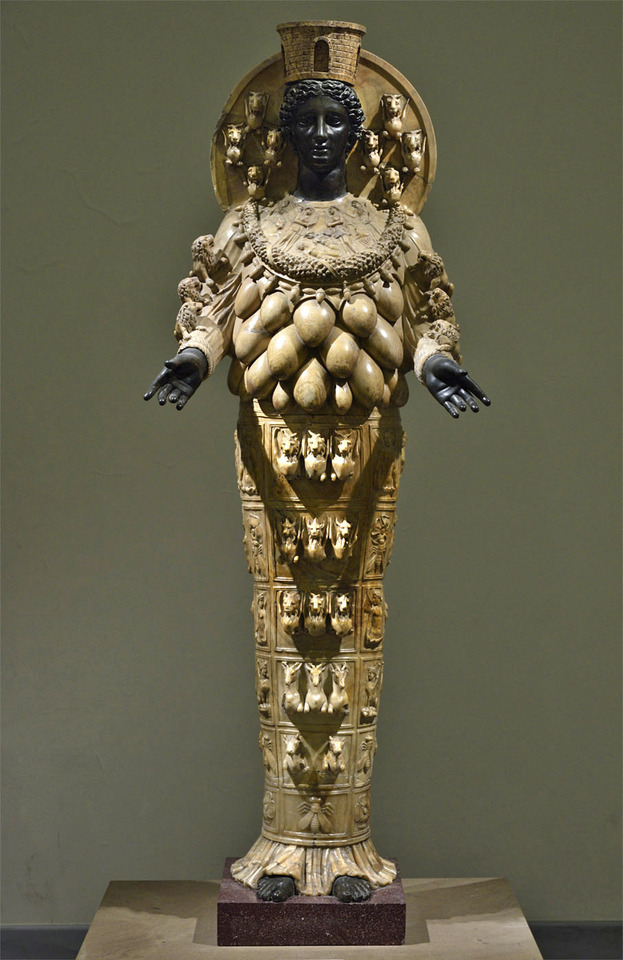
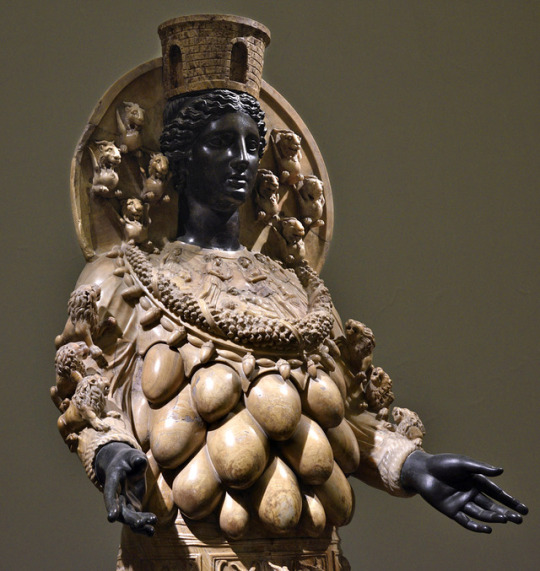
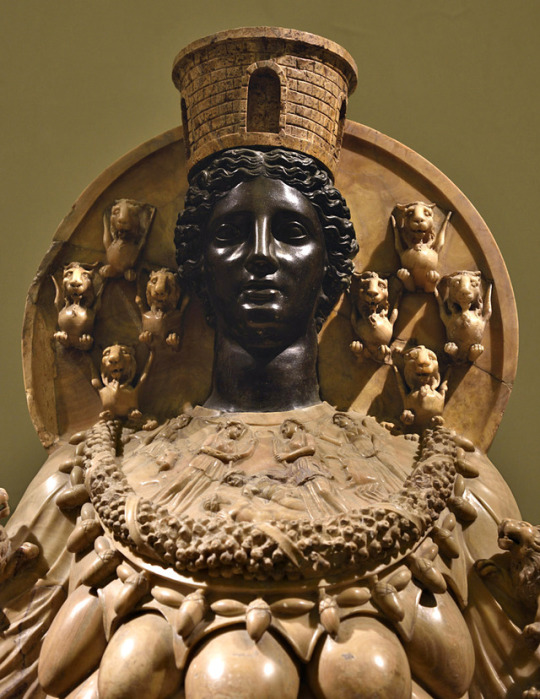
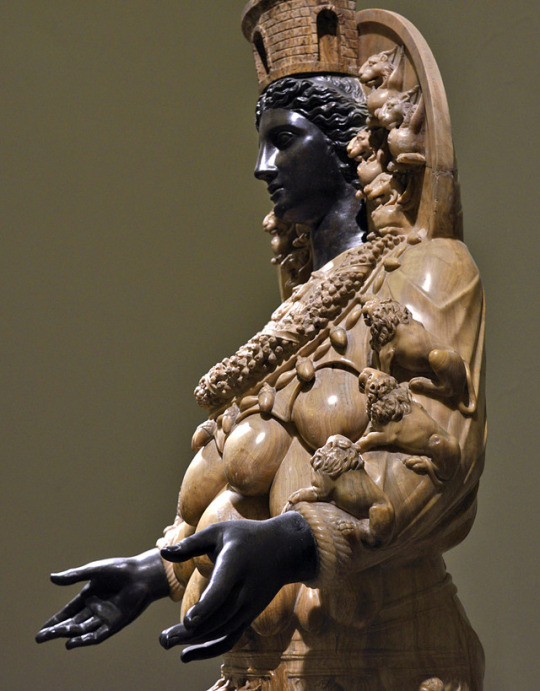

~ Artemis of Ephesus.
Date: Second half of the 2nd century CE.
Head, feet and hands restored by Valadier in bronze
Medium: Alabaster, bronze
Provenance: Naples, National Archaeological Museum
(Museo archeologico nazionale di Napoli)
2K notes
·
View notes
Photo
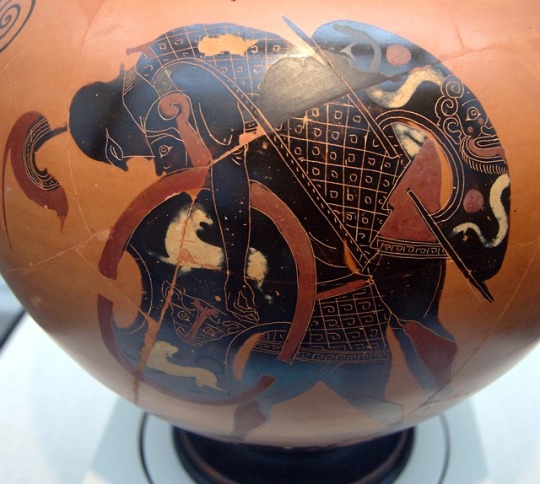
Ajax carries the body of the fallen Achilles off the battlefield at Troy. Side A of an Attic black-figure amphora, attributed to Exekias; ca. 540-530 BCE. From Vulci; now in the Staatliche Antikensammlungen, Munich.
376 notes
·
View notes
Quote
This memorial was raised by Damis for his horse:
steadfast, now passed, since bloody Ares
stabbed him through the chest. His black blood
bubbled through his courageous flesh,
and he soaked the earth with his agonising slaughter.
Anyte in the Greek Anthology (7.208)
μνᾶμα τόδε φθιμένου μενεδαΐου εἵσατο Δᾶμις
ἵππου, ἐπεὶ στέρνον τοῦδε δαφοινὸς Ἄρης
τύψε: μέλαν δέ οἱ αἷμα ταλαυρίνου διὰ χρωτὸς
ζέσσ᾽, ἐπὶ δ᾽ ἀργαλέᾳ βῶλον ἔδευσε φονᾷ.
#anyte#daily classics#she does crickets dying and she does warhorses' battle-deaths#women in antiquity#tagamemnon#greek anthology#ares#my translation
60 notes
·
View notes
Quote
For her cricket - nightingale of the fields - and for her oak-dwelling
cicada, a single grave was made by Myro,
the girl weeping her maiden's tears all the time; for both her playmates
were taken by the hard-hearted god when he came: Haides.
Anyte in the Greek Anthology (7.190); my translation
Ἀκρίδι τᾷ κατ᾽ ἄρουραν ἀηδόνι, καὶ δρυοκοίτᾳ
τέττιγι ξυνὸν τύμβον ἔτευξε Μυρώ,
παρθένιον στάξασα κόρα δάκρυ: δισσὰ γὰρ αὐτᾶς
παίγνι᾽ ὁ δυσπειθὴς ᾤχετ᾽ ἔχων Ἀίδας.
#tagamemnon#daily classics#anyte#haides#women in antiquity#animals#crickets#cicadas#greek anthology#fragments#my translation
131 notes
·
View notes
Note
Hello, I saw you mention the Ugaritic Texts in an earlier post. I was wondering, are there any good english translations of those currently in book format or otherwise?
I’m afraid I have no idea: it’s not really my field. I’m a very amateur Sumerologist at best, and even that just means I occasionally have to interact with Akkadian and other languages that used a cuneiform. You might do well to ask mostlydeadlanguages, from whom I reblogged that post.
I hope this helps, and I’m sorry I couldn’t be of more use.
2 notes
·
View notes
Quote
For in his invective against Philip's friends, he says, "Meant to be man-slayers by nature, they were man-layers in practice; though called courtiers, they were escorts."
Fragment of Theopompos in Demetrios' On Elocution (1.27); my translation
κατηγορῶν γὰρ τῶν Φιλίππου φίλων φησίν, ῾ἀνδροφόνοι δὲ τὴν φύσιν ὄντες, ἀνδροπόρνοι τὸν τρόπον ἦσαν: καὶ ἐκαλοῦντο μὲν ἑταῖροι, ἦσαν δὲ ἑταῖραι.᾿
#daily classics#tagamemnon#today we try to translate greek puns#Philip ii of macedon#theopompos#fragments#demetrios#de elocutione#on style#on elocution#puns#my translation
12 notes
·
View notes
Text
Commentary
Modern pop culture prefers War, Famine, Pestilence, and Death, though here we have no Pestilence (this seems to derive from a peculiar translation of the θανάτῳ that is one of the Horsemen's weapons as 'pestilence' or 'plague' in certain editions, despite the Horseman Θάνατος remaing the simple and literal Death earlier in the very same sentence).
Instead, by my reading, there is Conquest and Strife, so to speak - the division is between Greek πολέμιοι and ἐχθρός, or Latin hostis and inimicus, the enemies of the public state and the private individual. This was an intuitive and often-invoked duality (Plato, Cicero, &c.) in the Classical period, and so not likely to be subject of one complaint I heard on translating this elsewhere: that Conquest and Strife are too similar and therefore uninteresting to a modern culture.
I here break my general rule of not translating the Christian Bible because its language is so direly uninteresting.
The Four Horsemen
And I saw, and - there! - a white horse, and the one riding it held a bow, and he wore a garland, and he went out conquering and for the sake of conquest. …
And another horse came out, red, and to the one riding it was given the power to overpower the peace in the land - even so that he could turn its people to slaughtering each other - and a great sword was given to him. …
And I saw, and - there! - a black horse, and the one riding it held a balance in his hand. And I heard a voice among the four living beings saying, “A day’s food for a denarius, and three day’s barley for a denarius, and do no ill to the oil or the wine!” …
And I saw, and - there! - a pale horse, and the one riding upon it was named “Death”, and Haides followed him; and dominance was given to them each over a quarter of the land, to kill by blade and by hunger and by death and by the wild beasts of the land.
(Christian Bible, Book of Revelations 6.2-8; my translation)
καὶ εἶδον, καὶ ἰδοὺ ἵππος λευκός, καὶ ὁ καθήμενος ἐπ’ αὐτὸν ἔχων τόξον, καὶ ἐδόθη αὐτῷ στέφανος, καὶ ἐξῆλθεν νικῶν καὶ ἵνα νικήσῃ. …
Keep reading
10 notes
·
View notes
Text
The Four Horsemen
And I saw, and - there! - a white horse, and the one riding it held a bow, and he wore a garland, and he went out conquering and for the sake of conquest. ...
And another horse came out, red, and to the one riding it was given the power to overpower the peace in the land - even so that he could turn its people to slaughtering each other - and a great sword was given to him. ...
And I saw, and - there! - a black horse, and the one riding it held a balance in his hand. And I heard a voice among the four living beings saying, "A day's food for a denarius, and three day's barley for a denarius, and do no ill to the oil or the wine!" ...
And I saw, and - there! - a pale horse, and the one riding upon it was named "Death", and Haides followed him; and dominance was given to them each over a quarter of the land, to kill by blade and by hunger and by death and by the wild beasts of the land.
(Christian Bible, Book of Revelations 6.2-8; my translation)
καὶ εἶδον, καὶ ἰδοὺ ἵππος λευκός, καὶ ὁ καθήμενος ἐπ’ αὐτὸν ἔχων τόξον, καὶ ἐδόθη αὐτῷ στέφανος, καὶ ἐξῆλθεν νικῶν καὶ ἵνα νικήσῃ. ...
καὶ ἐξῆλθεν ἄλλος ἵππος πυρρός, καὶ τῷ καθημένῳ ἐπ’ αὐτὸν ἐδόθη αὐτῷ λαβεῖν τὴν εἰρήνην ἐκ τῆς γῆς καὶ ἵνα ἀλλήλους σφάξουσιν, καὶ ἐδόθη αὐτῷ μάχαιρα μεγάλη. ...
καὶ εἶδον, καὶ ἰδοὺ ἵππος μέλας, καὶ ὁ καθήμενος ἐπ’ αὐτὸν ἔχων ζυγὸν ἐν τῇ χειρὶ αὐτοῦ. καὶ ἤκουσα ὡς φωνὴν ἐν μέσῳ τῶν τεσσάρων ζῴων λέγουσαν Χοῖνιξ σίτου δηναρίου, καὶ τρεῖς χοίνικες κριθῶν δηναρίου· καὶ τὸ ἔλαιον καὶ τὸν οἶνον μὴ ἀδικήσῃς. ...
καὶ εἶδον, καὶ ἰδοὺ ἵππος χλωρός, καὶ ὁ καθήμενος ἐπάνω αὐτοῦ, ὄνομα αὐτῷ Ὁ Θάνατος, καὶ ὁ Ἅιδης ἠκολούθει μετ’ αὐτοῦ, καὶ ἐδόθη αὐτοῖς ἐξουσία ἐπὶ τὸ τέταρτον τῆς γῆς, ἀποκτεῖναι ἐν ῥομφαίᾳ καὶ ἐν λιμῷ καὶ ἐν θανάτῳ καὶ ὑπὸ τῶν θηρίων τῆς γῆς.
#daily classics#tagamemnon#christianity#bible#revelations#the four horsemen#apocalypse#my translation
10 notes
·
View notes
Photo
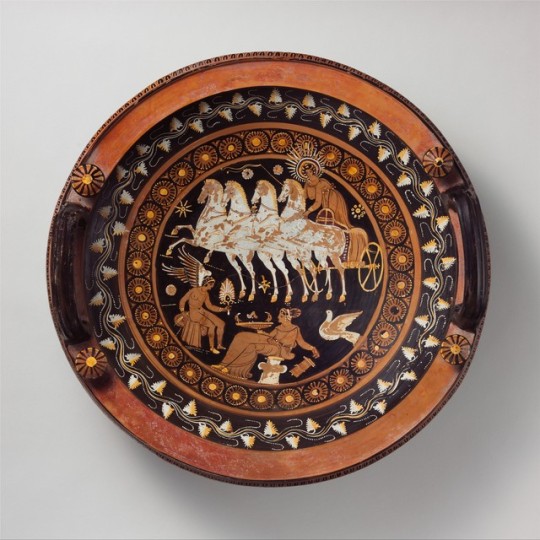
Terracotta lekanis (dish) by Stuttgart Group, Greek and Roman Art
Medium: Terracotta
Rogers Fund, 1969 Metropolitan Museum of Art, New York, NY
http://www.metmuseum.org/art/collection/search/255283
52 notes
·
View notes
Quote
As soon as he took the mortal blow, he immediately filled his hand with his own lifeblood, and hurled it into the air, and said, "You've won, Galilean."
Alleged final words of Julian the Apostate, the last pagan emperor (Theodoret, Church History 3.20); my translation
Δεξάμενον τὴν πληγὴν, εὐθὺς πλῆσαι τὴν χεῖρα τοῦ αἵματο��, καὶ τοῦτο ῥίψαι εἰς τὸν ἀέρα, καὶ φάναι· Νενίκηκας, Γαλιλαῖε
#tagamemnon#daily classics#Julian the apostate#christianity#theodoret#church history#church fathers#alas for the last of the romans#defiant to the end#(I really like Julian just for the Misopogon)#my translation#(also this is a really bad scan of what I think is probably a very bad old text so I apologise for errors in the Greek)
11 notes
·
View notes
Quote
there is no point trying to make the Greeks nice
J. C. Mann, ‘Gymnazo’ in Thucydides’ 1.6.5′, CR 24, 178, quoted in L. Llewellyn-Jones, ‘Domestic abuse and violence against women in Ancient Greece’, in S. D. Lambert, ed., Sociable Man, 2011. (via newfavething)
60 notes
·
View notes
Text
Ahhhhhh, that was a nice rant to write.
It’s never coming out of my drafts because I’d lose every follower I have, but it’s cathartic to rag on Tumblr’s failings.
3 notes
·
View notes
Text
Akhilleus' Last Stand
Meanwhile, the son of Peleus did not yet forget
his spirit, for in his unconquerable limbs
the black blood still boiled with eagerness for war.
Then not one of the Trojans dared to come near him,
even after he was shot, but stood far far away, like when a lion
makes countrypeople in the woods stand in awe, though it
has been shot by a hunter; despite being struck in the heart by an arrow,
it does not forget its courage, but stares about savagely
and roars terribly from its bristling jaws.
Just so, anger and the deadly wound roused the son of Peleus'
spirit to its highest, though the god's arrow broke him.
Even so, he sprang up and charged among his enemies,
mighty spear poised: he killed godlike Orythaon,
Hektor's noble companion, having struck him through the temple -
his helmet did not stop the great spear as it was intended to,
and instead it went straight through helm and skull
into the nerves of the brain, and put an end to his great life.
Hipponoos too he broke, thrusting his spear under his brow
into the roots of his eye; his eyeball fell to the earth
from under his eyelid, and his spirit flew down to to the house of Haides.
Alkathoos then he stabbed through the jaw
and cut away his whole tongue: he fell to the ground,
breathing his last, the spearpoint coming out of his ear.
And these he slew when they rushed to face him,
that godlike man, and he took the spirits of many others
as they fled, for in his heart the blood still boiled.
(Quintus of Smyrna, Posthomerica 3.138-63; my translation)
ὁ δ᾽ οὔπω λήθετο θυμοῦ
Πηλείδης: ἔτι γάρ οἱ ἀμαιμακέτοις ἐνὶ γυίοις
ἔζεεν αἷμα κελαινὸν ἐελδομένοιο μάχεσθαι.
οὐδ᾽ ἄρα οἱ Τρώων τις ἐτόλμα ἐγγὺς ἱκέσθαι
βλημένου, ἀλλ᾽ ἀπάνευθεν ἀφέστασαν, εὖτε λέοντος
ἀγρόται ἐν ξυλόχοισι τεθηπότες, ὅν τε βάλῃσι
θηρητήρ, ὁ δ᾽ ἄρ᾽ οὔτι πεπαρμένος ἦτορ ἄκοντι
λήθεται ἠνορέης, ἀλλὴ στρέφετ᾽ ἄγριον ὄμμα
σμερδαλέον βλοσυρῇσιν ὑπαὶ γεν��εσσι βεβρυχώς.
ὣς ἄρα Πηλείδαο χόλος καὶ λοίγιον ἕλκος
θυμὸν ἄδην ὀρόθυνε: θεοῦ δέ μιν ἰὸς ἐδάμνα.
ἀλλὰ καὶ ὣς ἀνόρουσε καὶ ἔνθορε δυσμενέεσσι
πάλλων ὄβριμον ἔγχος: ἕλεν δ᾽ Ὀρυθάονα δῖον,
Ἕκτορος ἐσθλὸν ἑταῖρον, ἔσω κροτάφοιο τυχήσας:
οὐ γάρ οἱ κόρυς ἔσχε μακρὸν δόρυ, μαιμώωντος
ἀλλὰ δι᾽ αὐτῆς αἶψα καὶ ὀστέου ἔνδον ἵκανεν
ἶνας ἐς ἐγκεφάλοιο, κέδασσε δέ οἱ θαλερὸν κῆρ.
Ἱππόνοον δ᾽ ἐδάμασσε κατ᾽ ὀφρύος ἔγχος ἐρείσας
ἐς θέμεθλ᾽ ὀφθαλμοῖο: χαμαὶ δέ οἱ ἔκπεσε γλήνη
ἐκ βλεφάρων: ψυχὴ δὲ κατ᾽ Ἄϊδος ἐξεποτήθη.
Ἀλκαθόου δ᾽ ἄρ᾽ ἔπειτα διὰ γναθμοῖο περήσας
γλῶσσαν ὅλην ἀνέκερσεν: ὁ δ᾽ ἐς πέδον ἤριπε γαίης
ἐκπνείων, αἰχμὴ δὲ δι᾽ οὔατος ἐξεφαάνθη.
καὶ τοὺς μὲν κατέπεφνε καταντίον ἀΐσσοντας
δῖος ἀνήρ: πολλῶν δὲ καὶ ἄλλων θυμὸν ἔλυσε
φευγόντων: ἔτι γάρ οἱ ἐνὶ φρεσὶν ἔζεεν αἷμα.
8 notes
·
View notes
Photo
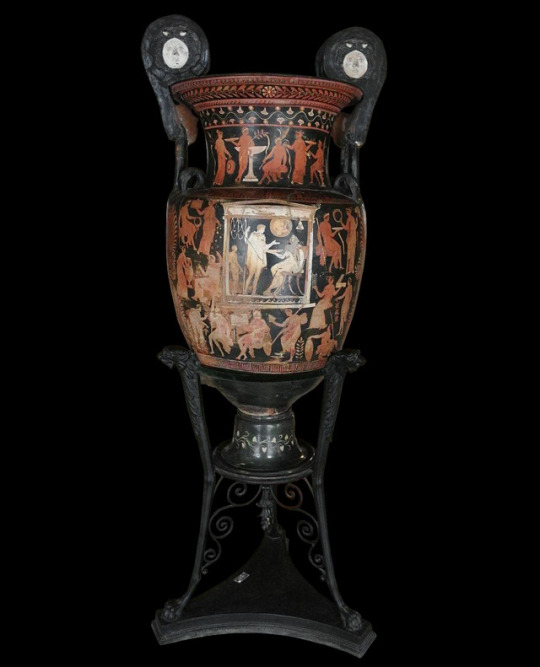
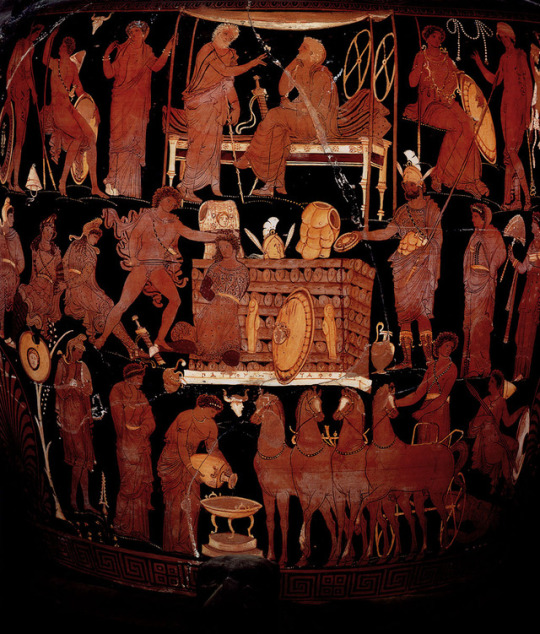
~ So-called “Vase of Patroclus”/Red-figure volute-krater.
Place of origin: Apulia
Artist: Darius Painter
Date: 340—320 B.C.
Medium: Clay
Provenance: Naples, National Archaeological Museum
(Museo archeologico nazionale di Napoli)
#red-figure#ceramics#krater#patroklos#naples#italy#europe#darius painter#art#classical art#ancient art
439 notes
·
View notes
Photo
… and it shall be lawful to make treaties with whomever he wishes, just as it was lawful for the Divine Augustus, for Tiberius Julius Caesar Augustus, and for Tiberius Claudius Caesar Augustus Germanicus.
And that it shall be lawful for him to hold a session of the Senate, to introduce a motion, to refer a motion, and to pass a decree of the senate by a motion and division, just as it was lawful for the Divine Augustus, for Tiberius Julius Caesar Augustus, for Tiberius Claudius Caesar Germanicus.
And that when a session of the Senate shall be held, by his desire or his authority, by his order or his mandate, or by his presence, the lawfulness of all matters therein shall be upheld and maintained, and it shall be as if the senate had been convened and held according to statute.
And that anyone whom – seeking a magistracy, power, command, or guardianship of anything – he shall commend to the Senate and People of Rome, and to whom he shall have given or promised his support in elections: consideration beyond the usual shall be taken of these men at any election.
And that to extend and to enlarge the boundaries of the pomerium, when he considers it in the public interest, shall be lawful for him, as it was for Tiberius Claudius Caesar Augustus Germanicus.
And that whatever he considers to be in accordance with benefitting the state, and the proper dignity of divine, mortal, public and private affairs, he may have the right and the power to do and to carry out, just as it was for the Divine Augustus, and for Tiberius Julius Caesar Augustus, and for Tiberius Claudius Caesar Augustus Germanicus.
And that, for whatever laws and public statutes it has been recorded that the Divine Augustus or Tiberius Julius Caesar Augustus and Tiberius Claudius Caesar Augustus Germanicus were not bound by them, the Imperator Caesar Vespansianus has been freed from those laws and public statutes. And whatever it was proper for the Divine Augustus or Tiberius Julius Caesar Augustus or Tiberius Claudius Caesar Augustus Germanicus to do in accordance with any law or bill, all these things shall be lawful for the Imperator Caesar Vespasianus Augustus to do.
And that whatever has been carried out, accomplished, decreed, or ordered by the Imperator Caesar Vespasianus Augustus, or by anyone at his order or mandate, before this law has passed, these acts shall be legal and valid, and it shall be as if they were done at the order of the people or the commons.
SANCTION
If anyone does or shall have done anything which is contrary to laws, bills, or public statutes, or decrees of the senate on account of this law; or if he shall have not done something on account of this law which it is proper for him to do in accordance with a law or bill or public statute or decree of the senate, this may not be a liability for him, nor may he be obliged to pay the people on its account, nor may anyone have permission to bring a suit or pass judgement because of this, nor may anyone permit a suit to be brought before him because of this.
(CIL VI 930; ILS 244; my translation)
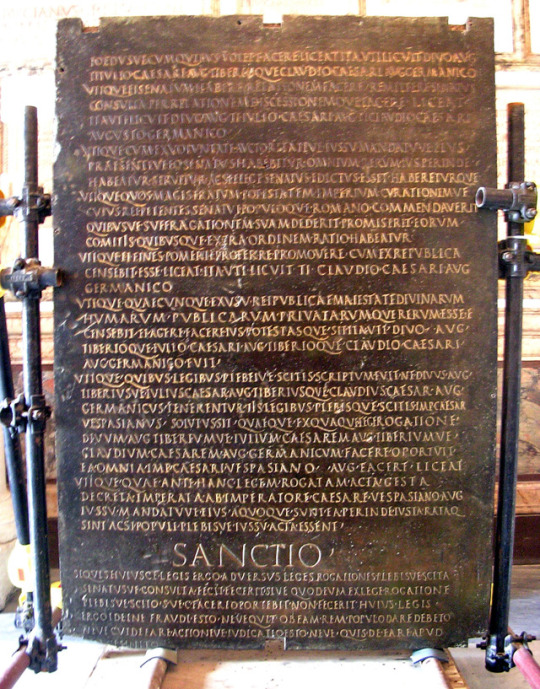
~ Law on the power of Vespasian.
Date: A.D. 69—70
Medium: Bronze
Provenance: Rome, Capitoline Museums, Palazzo Nuovo, Hall of the Faun
(Musei capitolini, Palazzo Nuovo, Sala del Fauno)
333 notes
·
View notes